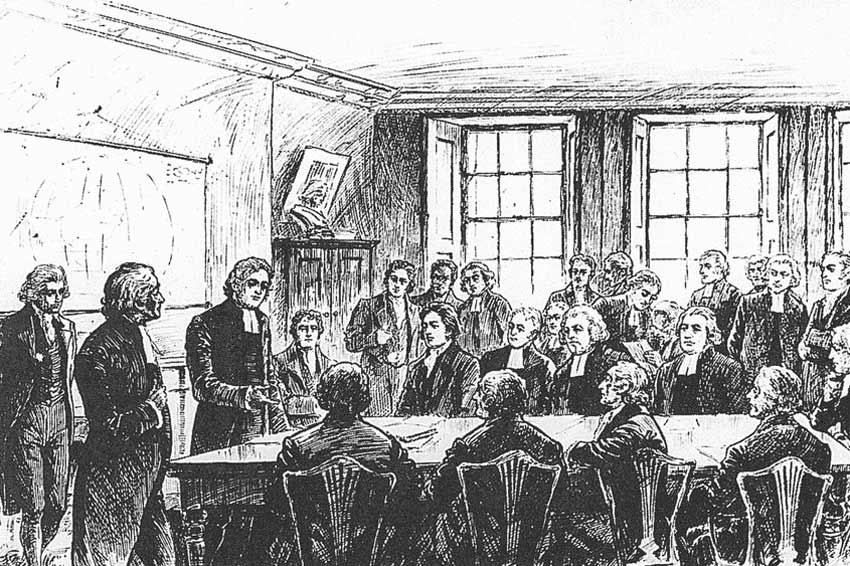Eclectic Society (Christian) on:
[Wikipedia]
[Google]
[Amazon]
{{Short description, Discussion Group founded 1783
The Eclectic Society was founded in 1783 by a number of Anglican
 In 1797,
In 1797,
clergymen
Clergy are formal leaders within established religions. Their roles and functions vary in different religious traditions, but usually involve presiding over specific rituals and teaching their religion's doctrines and practices. Some of the ter ...
and laymen as a discussion group, and was instrumental in the founding of the Church Missionary Society
The Church Mission Society (CMS), formerly known as the Church Missionary Society, is a British mission society working with the Christians around the world. Founded in 1799, CMS has attracted over nine thousand men and women to serve as mission ...
in 1799.
Origins
The society's early members included clergyman andpoet
A poet is a person who studies and creates poetry. Poets may describe themselves as such or be described as such by others. A poet may simply be the creator ( thinker, songwriter, writer, or author) who creates (composes) poems (oral or writte ...
John Newton
John Newton (; – 21 December 1807) was an English evangelical Anglican cleric and slavery abolitionist. He had previously been a captain of slave ships and an investor in the slave trade. He served as a sailor in the Royal Navy (after forc ...
(1725 - 1807), Rector
Rector (Latin for the member of a vessel's crew who steers) may refer to:
Style or title
*Rector (ecclesiastical), a cleric who functions as an administrative leader in some Christian denominations
*Rector (academia), a senior official in an edu ...
of Clapham
Clapham () is a suburb in south west London, England, lying mostly within the London Borough of Lambeth, but with some areas (most notably Clapham Common) extending into the neighbouring London Borough of Wandsworth.
History
Early history
T ...
and founder of Church Missionary Society
The Church Mission Society (CMS), formerly known as the Church Missionary Society, is a British mission society working with the Christians around the world. Founded in 1799, CMS has attracted over nine thousand men and women to serve as mission ...
John Venn
John Venn, Fellow of the Royal Society, FRS, Fellow of the Society of Antiquaries of London, FSA (4 August 1834 – 4 April 1923) was an English mathematician, logician and philosopher noted for introducing Venn diagrams, which are used in l ...
(1759 - 1813), Thomas Scott Thomas Scott may refer to:
Australia
* Thomas Hobbes Scott (1783–1860), Anglican clergyman and first Archdeacon of New South Wales
* Thomas Scott (Australian politician) (1865–1946), member of the Queensland Legislative Assembly
* Thomas Sco ...
the Commentator, Richard Cecil, and Henry Foster. The Eclectic Society met fortnightly, initially at the Castle and Falcon Inn, and later in the vestry of St John's Chapel, Bedford Road, London. At the outset in 1783, two of the founding clerics were relatively new in their Metropolitan incumbencies; Newton was four years established at St Mary Woolnorth (having moved from Olney), while Foster had held Long Acre for three years (having served as a lecturer in London since 1766). Cecil held parishes in Sussex, but resided in Islington. The society grew in influence as its membership both expanded and matured.
Foreign Missions
Foreign missions were first discussed in 1786, and again in 1789 and 1791 with the growing realization of the scope for a society that would evangelise indigenous peoples around the world. Foreign missions was again discussed in 1796, by which time both theBaptist
Baptists form a major branch of Protestantism distinguished by baptizing professing Christian believers only (believer's baptism), and doing so by complete immersion. Baptist churches also generally subscribe to the doctrines of soul compete ...
and London Missionary Societies had been founded, but it was not until three years later that action was taken.
 In 1797,
In 1797, Josiah Pratt
Josiah Pratt (1768–1844) was an English evangelical cleric of the Church of England, involved in publications and the administration of missionary work.
Early life
The second son of Josiah Pratt, a Birmingham manufacturer, he was born in Birmin ...
, a clergyman from Birmingham who came to London as a curate, joined the Eclectic Society and in February 1799 he proposed the following question for discussion: "How far may a periodical Publication be made subservient to the interest of Religion?" The discussions led, two years later, to the starting of the ''Christian Observer
The ''Christian Observer'' was a London evangelical periodical, serving a readership in the Church of England. It appeared from 1802 to 1874.
History
The ''Christian Observer'' was founded by William Hey "in response to the dissenters' ''Leeds ...
'' which became for much of the nineteenth century a valuable organ of Evangelical principles and work. The following month, the subject for discussion was "What methods can we use more effectually to promote the knowledge of the Gospel among the Heathen?" and it was ultimately resolved at this meeting to form a society. At a public meeting in April, the Church Missionary Society for Africa and the East was formed.
References
*Eugene Stock, ''History of the Church Missionary Society'' Vol 1 (London 1899) *John H. Pratt, ''The Thought of the Evangelical Leaders: Notes of the Discussions of the Eclectic Society, London During the Years 1798-1814'' (Reprint: Edinburgh, Banner of Truth, 1978) Church of England missionary societies Church of England missions Evangelical Anglicanism History of the Church of England Church of England societies and organisations 1783 establishments in Great Britain Clapham Sect